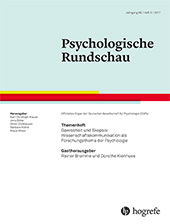Literatur
(2012). ACATECH Position: Perspektiven der Biotechnologie-Kommunikation. Kontroversen – Randbedingungen – Formate (acatech POSITION). Heidelberg: Springer.
(2017). Wie können Lehrkräfte und ihre Schülerinnen und Schüler lernen, fragile Evidenz zu verstehen und zu nutzen? Psychologische Rundschau, 68, 188 – 192.
(2014).
Science and technology: Public attitudes and understanding . In National Science Board, Ed., Science and Engineering Indicators 2014 (pp. 1 – 53). Arlington VA: National Science Foundation (NSB 14 – 01).(1985). The Public Understanding of Science. London: Royal Society.
(2016). Transfer entails communication: The Public Understanding of (social) science as a Stage and a Play for implementing evidence based prevention knowledge and programs. Prevention Science. Advance online publication. doi:10.1007/s11121-016-0686-8
(2014a). Understanding the Public Understanding of Science: Psychological Approaches (Special Issue). Educational Psychologist.49 (2).
(2014b). The Public’s Bounded Understanding of Science. Educational Psychologist, 49 (2), 59 – 69. doi: 10.1080/00461520.2014.921572
(2014).
Wissenschaftsverständnis und Wissenschaftskommunikation . In T. SeidelA. KrappHrsg., Pädagogische Psychologie (6. Aufl., S. 55 – 81). Weinheim: Beltz.(2014). Are we all scientific experts now? Cambridge UK: Polity Press.
(2016). Scientific Uncertainty in Mediated Communication (Special Issue). Public Understanding of Science. 25 (8).
(2011). Salvaging science literacy. Science Education. 95 (1), 168 – 185. doi: 10.1002/sce.20414
(2013). Values, perceived risks and benefits, and acceptability of nuclear energy. Risk Analysis, 33, 307 – 317. doi: 10.1111/j.1539-6924.2012.01845.x
(2016).
Trust in Science and the Science of Trust . In B. BlöbaumEd.. Trust and Communication in a Digitalized World. Models and Concepts of Trust Research (pp. 143 – 159). Berlin: Springer.(2016). Learning Through Communication: How Arguing About Scientific Information Contributes to Learning (Special Issue). Zeitschrift für Pädagogische Psychologie/German Journal of Educational Psychology, 30 (2/3).
(2003). Maps of bounded rationality: Psychology for behavioral economics. The American Economic Review, 93, 1449 – 1475. doi: 10.2307/3132137
(2010). The feasibility of folk science. Cognitive Science, 34, 826 – 862. doi: 10.1111/j.1551-6709.2010.01108.x
(2017). Der Einfluss von Abbildungen auf das Verstehen von und Vertrauen in wissenschaftsbasierte Informationen. Psychologische Rundschau, 68, 198 – 202.
(2016). Scientific uncertainty in the public discourse. How scientists, media and audiences present und process scientific evidence (Special Issue). Communications – the European Journal of Communication Research, 41 (3).
(2013). Audience Perspectives on Science Communication (Special Issue). Journal of Media Psychology, 25 (1).
(2017). Wissenschaftskommunikation in naturwissenschaftlich-technischen Museen aus psychologischer Sicht. Psychologische Rundschau, 68, 182 – 187.
(2017). Produktion von naturwissenschaftlichen Informationen im Internet am Beispiel von Wikipedia. Psychologische Rundschau, 68, 172 – 176.
(2015). A Look at what the public knows and does not know about science. Washington, D.C.: PEW.
(2017). Modi der Verständlichkeit und die Magie des Unverständlichen. Psychologische Rundschau, 68, 203 – 207.
(im Druck). Verstehen konfligierender wissenschaftlicher Informationen durch Laien: Probleme, zugrundeliegende kognitive Prozesse und psychologische Interventionen. Psychologische Rundschau.
(2014). Comprehension and Validation of Text Information (Special Issue). Discourse Processes, 51 (1 – 2).
(2017). Motivierte Wissenschaftsrezeption. Psychologische Rundschau, 68, 193 – 197.
(Hrsg.). (2015). Wissenschaftskommunikation im Wandel. Köln: Herbert von Halem Verlag.
(2014). Addressing challenges to public understanding of science: Epistemic Cognition, Motivated Reasoning, and Conceptual Change. Educational Psychologist, 49 (2), 123 – 138. doi: 10.1080/00461520.2014.916216.
(2013). Multiple Document Comprehension (Special Issue). Cognition and Instruction, 3.
(2017). Selektion, Integration und Evaluation: Wie wir das Internet nutzen, wenn wir uns über Wissenschaft informieren wollen. Psychologische Rundschau, 68, 177 – 181.
(2016). In science communication, why does the idea of the public deficit always return? Exploring key influences. Public Understanding of Science, 25, 415 – 426. DOI: 10.1177/0963662516629750
(2015).
Functional scientific literacy: Seeing the science within the words and across the web . In L. CornoE. M. AndermanEds., Handbook of educational psychology: 3rd edition (pp. 269 – 280). London: Routledge.(2005). Die Wissenschaft der Öffentlichkeit. Essays zum Verhältnis von Wissenschaft, Medien und Öffentlichkeit. Weilerswist: Velbrück Wissenschaft.
(2016). Wissenschaftskommunikation – Schlüsselideen, Akteure, Fallbeispiele. Berlin: Springer.
(2008). Parental views on pediatric vaccination: the impact of competing advocacy coalitions. Public Understanding of Science, 17, 231 – 243. doi: 10.1177/0963662506067662
(2015). Online communication as a window to conspiracist worldviews. Frontiers in Psychology, 6. doi:10.3389/fpsyg.2015.00836



